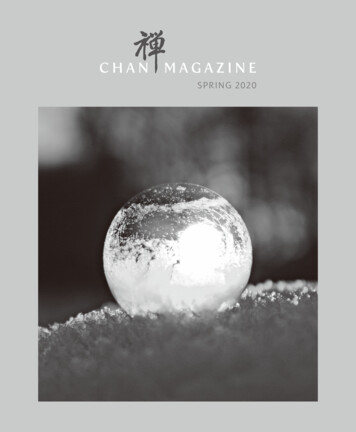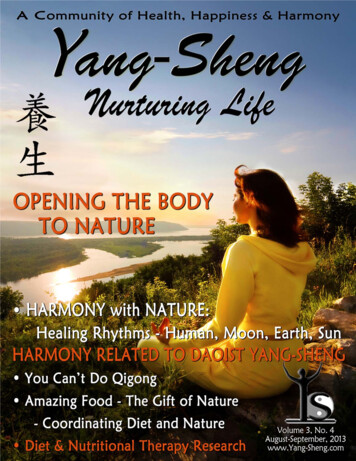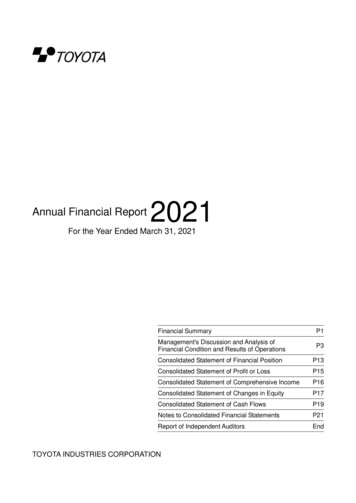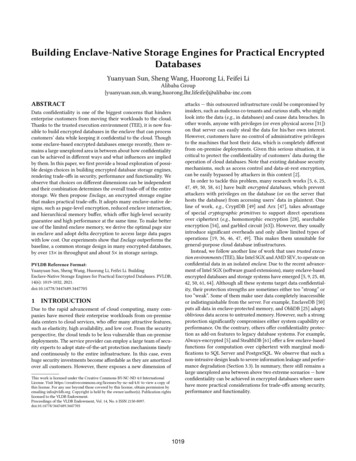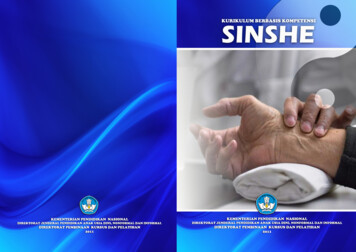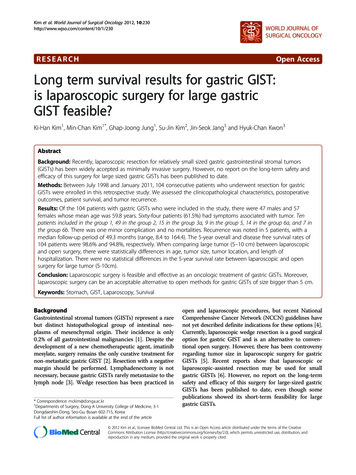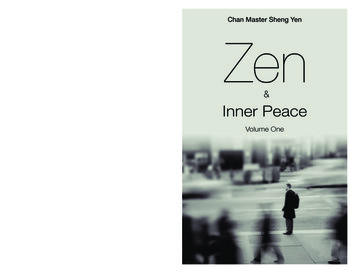
Transcription
Chan Master Sheng YenVenerable Chan Master Sheng Yen (1930-2009) was oneof the twentieth century’s foremost Buddhist scholars andmeditation masters, and was instrumental in the revival ofChinese Buddhism in modern times. Venerable Sheng Yen wasborn into a humble farming family near Shanghai in 1930; hebecame a novice Buddhist monk at the age of 13. During theCommunist takeover of China in 1949, he escaped with theNationalist army to Taiwan. At the age of 28, after 15 yearsof strenuous scriptural study and struggle in his meditationwork, while sojourning at various monasteries in southernTaiwan, he had the deepest spiritual experience of his life.Soon after, he entered into a solitary six-year meditationretreat to deepen his realization. He later received formallineage transmission in both the extant lines of Chan (Zen)Buddhism, making him the 57th generation master of theLinji line and the 52nd generation master of the Caodongline of Chan. In 1969 Venerable Sheng Yen went to Japan toattend graduate school, with the conviction that a strong education would be required to revive Chinese monasticism.In six years he obtained Master’s and Doctorate degrees inBuddhist Literature from Rissho University, becoming the firstmonk in Chinese Buddhist history to earn a doctorate.For the last thirty years of his life, he tirelessly devoted all of hisenergy to advancing Buddhist education, reviving the tradition ofrigorous education for monks and nuns, leading intensive Chanmeditation retreats worldwide, engaging in interfaith outreach,and working on behalf of world peace, youth development, andgender equality.Venerable Sheng Yen passed away peacefully on February 3rd,2009. He was revered by tens of thousands of students aroundthe world. His wisdom and compassion can be found in his booksin Chinese, English, Japanese, and several other languages, andin the teachings of his students and Dharma heirs both in Asia andthe West.Dharma Drum MountainZen&Inner PeaceVolume One
Zen&Inner PeaceVolume OneChan Master Sheng Yen
Dharma Drum Mountain
Zen and Inner Peace(Great Dharma Drum)Talks with Master Sheng Yen Dharma Drum Publications 2014Chan Meditation Center90-56 Corona Ave.Elmhurst, NY 11373(All rights reserved)
About the Chan Meditation CenterIn 1979, Master Sheng Yen established the ChungHwa Institute of Buddhist Culture, more commonlyknown as the Chan Meditation Center. The missionof CMC is to be a Buddhist meditation and practicecenter for anyone whose good karma brings them toits front door. (As often is the case, adventitiously.)CMC has a varied and rich offering of classes inmeditation and other forms of Buddhist practice, inparticular, its Sunday Morning Open House, whichis a very popular event for individuals as well asfamilies. It features meditation sittings, talks on Chanand Buddhist Dharma, and a vegetarian luncheon.All are welcome.Information about CMC is available athttp://chancenter.org.
About the Dharma Drum Retreat CenterIn 1997, Master Sheng Yen established the DharmaDrum Retreat Center in Pine Bush, New York. It isa sister organization to the Chan Meditation Center,and is located about two hours from the ChanMeditation Center by car.DDRC offers a rich schedule of intensive Chanmeditation retreats of varying lengths, from 3-dayweekend retreats, to those of longer duration,typically 7 to 10 days. While the retreats are opento all without regard to affiliation, it is preferredthat participants have at least some beginner-levelmeditation experience and/or have attended at leastone intensive meditation retreat.Information about DDRC is at:http://www.dharmadrumretreat.org
AcknowledgmentsOur gratitude to the Chan Meditation Center forproviding the resources for making this bookpossible: Abbot Guo Xing Fashi, Chang Hwa Fashi,Guo Sheng Fashi, and all the current and previouslyresident Dharma teachers, as well as many devotedvolunteers.Thanks to all those who contributed to conceiving,producing, and recording the original series,especially:Teacher: Chan Master Sheng Yen (1930-2009)Producer/Director: Mr. Zhao DashenProgram Host: Ms. Chen Yue-chingThe Dharma Drum Mountain Cultural Center,TaiwanThanks to those who helped to transcribe, translate,edit, proofread, design, and publish this edition.Transcription/translation: Dharma Drum Mountaintranslation teamEngish text editors: Ernest Heau, Jim Teng
Assisting editors: Nancy Bonardi, Warren HsingBook layout and design: Chih-ching LeeThanks to the following members of the DDMBASan Francisco Chapter: David John Burrowes,Allen Chang, Adriane Chen, Ping Liu, Jean Yu.Thanks also to Sin E Tang of the DDMBA St.Louis Branch.We also acknowledge many of the people who helpedmake the television series and this book possible,but whose names we were not able to obtain for thisprinting. To them go our sincere apologies.
Table of ContentsPrefaceTopic One: Development of Self 1Self-Development through Learning from OthersSelf-Development through Managing EmotionsSelf-Development – Understanding of Self andEmpathy for OthersApplying Compassion in Understanding OthersSelf-Dissolution – the Ultimate Goal of Self-CultivationSelf-Dissolution for Ordinary PeopleSelf-Dissolution through Gratitude and RepentanceTopic Two: Emotional Intelligence 35Putting Out the Mental Fire of AngerEliminating Anxiety and FearImproving EQ through MediationManaging Emotions through BuddhadharmaDealing with AngerCompassion has No Enemies and Wisdom EngendersNo VexationsApplying Compassion and Wisdom in Daily LifeTopic Three: Attachment and Jealousy 65Attachment Brings SufferingPrinciples Versus Self-centeredness
Do Not Attach to Anything, Not Even to DharmaEliminating AttachmentBreak the Attachment to Life and DeathJealousy and Its CausesEliminating JealousyTopic Four: Temptation and Desires 99Genuine Love is GivingLetting Go of Attachment – Awaken AmidstBeing SentientEliminating Attachment to Worldly Emotionsand DesiresDharma as an Antidote to TemptationCompassion Amidst TemptationBenefits of Compassion for Ourselves and OthersMethods for Coping with TemptationTopic Five: The Workplace 129The Meaning of WorkInteracting with CoworkersBeing a Good ManagerDealing with Complaints EffectivelyEffective CommunicationDealing with AdversitiesEQ in the Workplace
PrefaceThe Chan masters of old times discovered theprinciples of Chan through their own practice and sharedthem with their disciples so that they too, could awaken tothe essence through the teachings. In the TV series “GreatDharma Drum,” which was first broadcast by Taiwan’sChinese Television System, modern-day Chan Master ShengYen, using accessible language and media technology,addressed questions posed by the host, Ms. Chen Yueqing.Using Chan wisdom and compassion, Master Sheng Yenprovided easy-to-understand and practical guidance to addressthese questions that are commonly experienced by many indaily life.This book is a selection of five of the ten topics thatwere re-broadcast in the U.S. as “Zen and Inner Peace,”and were translated into English and compiled into thisvolume as part of the “Passing of the Lamp” commemorationof Master Sheng Yen’s passing in 2009. Each of the fivetopics contains seven conversations between Master ShengYen and host Ms. Chen. The topics include major themes ofeveryday life, such as self-development, emotionalmanagement, attachment, career and Chan. In a forthcoming
second volume, the Chan Meditation Center will publish theremaining five topics of “Zen and Inner Peace.”Topic One: Development of Self. The stages of progressfrom having a “self” to no-self, or the no-mind of Chan.Starting from self-understanding, one acknowledges one’sstrengths and weaknesses, with the end goal of dissolution ofthe self through continuous improvement and growth.Topic Two: Emotional Intelligence. Leveraging thepractice of patience, as well as understanding the influenceof causes-conditions and causes-effects, and the concept ofemptiness, to rid oneself of anger. Seeing the nature of thefive aggregates (the components of the “self”), to removefear and insecurity. Using Chan practice to tune and relaxthe body, breath and mind, elevating emotional intelligence.Topic Three: Attachment and Jealousy. Examining themotivation to clarify whether one is attached or sticking toprinciples.Topic Four: Temptation and Desires. Discussing ways toalleviate desire and temptation through constant mindfulness,practicing compassion, counting the breath, or reciting theBuddha’s name.Topic Five: The Workplace. Working to contributing self,learning, and growing, rather than just earning a salary orcomparing ourselves with others.XII
This rare treasure of a book abounds with wisdom,especially for those who are interested in learning andexperiencing Chan and Buddhism. As buddha nature iswithin all beings, this book expounds the meaning of “Life isChan, and Chan is Life.” Everyone can benefit by applyingChan wisdom and compassion in daily life, regardless ofthe complexity of their life, their environments andinterpersonal relationships, along with the associatedstresses and conflicts. The more one learns and applies theseprinciples, the more one benefits. At a minimum one canlessen their vexations, and then further oneself to achievehappiness with an eventual advance into the essence of Chan.May all readers practice Chan at all times and benefitfrom the experience wherever they go.Ven. Guo Xing FashiAbbot, Chan Meditation Center, Queens, New YorkAbbot, Dharma Drum Retreat Center, Pine Bush, New YorkXIII
Topic One Development of Self1
Self-Developmentthrough Learning from OthersAugust 21, 1998Ms. Chen: Hello, everyone. Welcome again to GreatDharma Drum. In our last program the Master taught usthat perfecting the self can be seen as a three-stage process:affirming the self, developing the self, and dissolving theself. To affirm the self we must be modest regarding ourstrengths and we must learn from our shortcomings. Thatway we can continually develop the self. Let’s ask MasterSheng Yen for further guidance. Master, are there any othermethods besides self-affirmation we can use to help us grow?Master Sheng Yen: Yes, through self-affirmation –ongoing self-affirmation. Self-affirmation means identifyingand understanding our strengths and weaknesses. We remainmodest and seek improvement. That way, we are actuallydeveloping ourselves, which is the same as improvingourselves. We need to continually do this. It’s not a task thatcan be done overnight. Actually, just as learning is neverending, improving our character bears no limits.The first step in self-affirmation is to identifyour strengths and weaknesses, and then to overcome ourweaknesses and increase our strengths. In fact, even withall our strengths and shortcomings, there’s always room for2
improvement. Next, we should not just focus on our ownstrengths and weaknesses, while failing to notice those inothers. The best way to develop and improve ourselves isto be more considerate of others, knowing both others andourselves.I’m not only talking about the professional world,in which we have to know ourselves as well as others. Idon’t mean in order to compete with and gain the upperhand; rather, it’s about recognizing strengths in others,starting with the people around us. A husband must be ableto appreciate his wife’s strengths, and a wife should see herhusband’s. Parents should do the same with their children.This will enable people to respect as well as learn from eachother. Some might ask, “What on earth can we learn fromchildren?” Actually, many parents do need to learn fromtheir children. Of course not in terms of book knowledge;rather, much wisdom can be gleaned from a child’s behavior.By handling our child’s problems, we grow in wisdom andcompassion. In this sense, children are our teachers – theyare very good teachers, and they have no pretensions. Theyare genuine teachers.So, learning more about others people’s strengthswill certainly do us a lot of good. Besides the people in ourown circle, beyond our own families, haven’t we learnedsomething from people we come across in everyday life,from all walks of life? We know that Confucius had questions3
about everything. He once entered an ancestral shrine andasked about everything and anything; there were still manythings he didn’t know. Once, observing a farmer at work, hefelt that farmers were superior to him in some respects, andthat there was much he could learn from them. There are somany people we can learn from. And if we have a specialtyof our own, we must keep on getting better at it.Another step is to learn and gain experience fromall people, all things, and all phenomena that we encounter.There is a saying, “Read ten thousand books, travel tenthousand miles.” This is about continually educating anddeveloping ourselves. This is about others’ strengths. And,if we are oblivious to others’ shortcomings, or consciouslyoverlook them, saying that their faults are their strengths, oreven that they are flawless – that’s simply wrong. That waywe have no standard for right and wrong, good and bad – thatcan harm both others and ourselves. As such, we should lookat shortcomings of others as a mirror to reflect on our own.Between couples, if one demands that the otherchanges, and vice versa, that may not work as well. It is betterthat we eliminate in ourselves the flaws and shortcomingsthat we think the other person has. Don’t we need to discuss itwith our spouse? We can, actually. But we must not demandchanges or make accusations.Chen: And we can’t point fingers.4
MSY: No we should not. What we consider a flaw,our spouse may see as part of his or her character, and maybelieve that’s what made them who they are. It may bethere’s just no way that they can change. If that’s the case,we’d better not make the same mistake. As to whether heor she will change, we can give them advice. If they can’taccept it, then we should tolerate them. Tolerance itself isalso a form of self-development.Chen: Thank you for your guidance, Master.Confucius teaches us to learn from everyone; others’strengths and weaknesses can be an example to us and serveas an impetus for growth. We hope you’ll join us next time aswe continue to share more wisdom of the Dharma.Summary: Spiritual practice is a never-endingprocess of self-development: Avoid repeating the samemistakes, be they others’ or your own. And learn frompeople’s good points.5
Self-Development throughManaging EmotionsAugust 25, 1998Ms. Chen: Hello, everyone. And welcome again toGreat Dharma Drum. In our last program, the Master taughtus another method of developing the self. He said that weshould continuously observe our mind, be aware of ouremotions and thoughts, and use our willpower to controlthem. I think many people will find this method useful.Are there any even more effective methods? Let’s askMasterSheng Yen for further guidance.Master, in today’s chaotic, relentless, fast-pacedtimes, people experience emotional turmoil almostcontinuously. So, it is essential to know how to control ouremotions. Besides the method you’ve already taught us,could you tell us about other methods?Master Sheng Yen: As we discussed in our lastprogram, a method you can use in everyday life is to redirectyour focus away from things that trigger vexations. Forexample, when you take a walk, drink a glass of water, listento some tranquil music, or chat with a friend, your emotionswill start to be at ease.Chen: Besides this method, are there any other ways?6
MSY: Yes, and this is more subtle. First, we try tofind out where our thoughts emerge from, and how theyemerge. Actually, we won’t always be able to find out wherethey come from; they just suddenly emerge. Sometimes wemay know the reason, but if we know the reason, why do wethink getting upset helps? It doesn’t help at all. Managingthe situation would help the moment. Do vexing emotionsactually do us any good? Not only do they not do any good,they also disturb our minds, making us speak harshly orbehaving rudely. And, who knows how his affect our body,even at the cellular level?Chen: It harms both our body and mind.MSY: Exactly. Moreover, it’s rather a waste of ourenergy. That’s why people feel quite tired after an outburstof anger, or after feeling agitated. It’s as if they are exhaustedafter doing a great deal of hard work. Sometimes they evenshake with anger. When they no longer feel anger they stillfeel shaky. It’s pretty tiring, quite exhausting. Since that’sthe case, why be self-destructive? It’s unnecessary. It’s moreimportant that we face up to a problem and deal with it.Although we should first examine exactly how athought or emotion arises in our mind, we can’t actually. Wesimply have no way of knowing why an emotion emerges;so, it’s not worth our attention and we should ignore it. If anincident never happened or has already happened – perhaps7
long ago – what’s the point of remaining angry? When weknow the problem and the reason for it – where it arisesfrom, where it vanishes to, when it comes and goes – thenwe don’t need to get angry. Besides, in terms of one’s health,it’s also unnecessary. This is a very wise way of dealing withour problems.Wisdom means understanding our emotions as theycome and as they go. Being able to do that, we should thenhandle things the way they’re supposed to be handled. Havingdone what we can, we needn’t worry about the results; nothaving to worry, we are able to put our minds at ease.On a higher level, another method is not to worryabout where a thought arises from and vanishes to – notto consider its origin, its underlying cause, and its trigger.Ignore all these factors and simply look at it: Is it a goodthought? Is it a wise or troubled thought? If it is a troubledthought, then it’s a useless thought.As humans we must cultivate wisdom, which is whatmakes us lovable, deserving, and worthy. How stupid if welack wisdom and always troubled ourselves! Not only wouldit not be wise, it would be foolish. However it arises, whethergood or bad, we should immediately let go of a troublingthought.Chen: You mean we ignore how it arises and whetherit’s good or bad; emotions of any kind are not good. Just seewhether it is wise or deluded?8
MSY: That’s right. If we have wisdom, it will bringcoolness, while anguish is stiflingly hot. Anguish is like apressure cooker, with perpetual heat causing extreme agony,while wisdom brings serenity and joy. When one is feelingtroubled, or “feverish affliction” as it’s termed in Buddhism– “affliction” refers to trouble and “feverish” means burninghot and scorching – though one is not in actual hell yet, thestate of mind is like a “scorching hell.”So, when we’re caught up in anguish, we areeffectively in hell. No one is putting you in hell exceptyourself. How stupid that is. So, when an afflictive emotionarises, you should put a stop to it without hesitation. Then itwill disappear immediately after it arises. This is not easilydone, though. We should still start from the second level Ijust mentioned – as a thought arises and perishes, just watchit arise and perish. This is where our cultivation should start.Then, we move on to where we discern an arising emotionand make it disappear, to detect it and make it vanish rightaway. Whoever can do this we call a good and wise person.Though not completely free from anguish, such a persondoesn’t allow his distress to harm himself and others. This isan essential stage in the process of self-development.Chen: Thank you for your guidance, Master. Pleasejoin us in our next program as we share the wisdom of theDharma.Summary: Wise persons master the refined art of9
observing the rising and perishing of thoughts, allowingthemselves to elude the endlessly arising afflictions of thedeluded mind.10
Self-Development – Understanding of Selfand Empathy for OthersAugust 26, 1998Ms. Chen: Hello everyone. Welcome again to GreatDharma Drum. In our last program, the Master taught ushow to maintain a constant awareness of the mind, to applywisdom to be aware of the rise and fall of emotions, and howto resolutely rid ourselves of mental anguish in an instant.Are there other ways to bolster our self-development? Let’sask Master Sheng Yen for further guidance. Master, it wouldbe great if I were aware of an afflictive thought as it arises,exactly as you described it to us, and then immediately let itgo without hesitation. Are there any even better methods?Master Sheng Yen: No, there aren’t. That is,knowing ourselves and others is the principle. First is tounderstand our own mental activities and our emotions asthey come and go, and then to deal with our problems. Bythat I mean self-cultivation is about alleviating vexationsand growing in wisdom. It also means developing lovingkindness and compassion toward others. How does onedevelop compassion? Some think it’s about showing concernand caring for people; being generous, comforting them withwords. They may think that’s all there is to it. Actually, it’snot that easy. Some people get on well with others while11
some don’t, and so are considered unsociable, taciturn, orreticent. But this is hard to say. Some people are not eloquentyet well-liked; others are eloquent yet unpopular. So, onedoesn’t have to be eloquent to be well-liked. Being likedlies in empathizing with others, understanding that othershave problems just as we do—that their problems need to besolved just as ours do. We don’t like being verbally abused,and other people don’t either. Compassion also meansknowing that while we want to rid ourselves of vexations,others are no different. We can relate to others by puttingourselves in others’ shoes, so to speak. We treat others as wetreat ourselves. We consider others by imagining ourselvesin their position.Chen: We should ask, “If I were this person whatwould I do? How would I want others to treat me?”MSY: That’s right. “How would I feel, how wouldI want to be treated, what would I think?” and so on. Theproblem is that most people tend to think: “You’re wrong.Why on earth are you so troubled; why so upset, why doyou have so many problems?” Or, “There can’t be that manyproblems; that’s ridiculous; you’re bringing trouble ontoyourself.” Most people will only reproach others, withoutputting themselves in their shoes. When we are in a similarsituation, we might be worse off. Or maybe our situationisn’t all that bad, and our resources, skills, knowledge, and12
our ability to handle matters are different from that of theafflicted. Then we won’t feel as much pain in the same kindof situation, because we have developed. However, in theprocess of our evolution, we have certainly experiencedhow others regard us, how they treat us, interact with us,make demands on us, criticize us. We will encounter theseproblems ourselves.Sometimes we feel we are wronged, completelymisunderstood. Some of my disciples will say, “Shifu, youhave misunderstood me,” or “Shifu, you don’t understandus.” They mean that I am not them, therefore my demands,guidance, and admonitions are not necessarily correct. Theywill say, “We’re not like what you think; this is only yourview.” If that were really the case, then I would be lacking incompassion and wisdom. But it’s hard to say; sometimes I’mright and it’s just that their level of understanding is simplynot there yet. It could be that my demands or guidance wereright, but they did not catch on. Sometimes, they will say,“Shifu, you’re flying in the sky, while we’re just crawling onthe ground.”It’s not that I’ve set the standards too high; rather, Isee further – I see the big picture, and I see things in moredepth. They can’t keep up, can’t see as high, can’t see as deep,can’t see as far; they can’t really see the whole picture. So,when they can’t relate to what I say, they feel misunderstood.But after I talk to them further, they’ll come to realize that13
their Shifu is actually being compassionate. The point is howwe can best benefit people according to their actual needs.Nowadays many parents have no idea how to be parents.They simply give whatever their child asks for, and are tooaccommodating to their child’s dislikes. Whatever the childwants, they are permissive and say “Fine.” Therefore, thechild is not clear about right and wrong, and how to actlike a decent human being. In this case you’re not showinglove, but spoiling and harming the child. Therefore we needto apply wisdom to enable us to be more attuned to otherpeople’s feelings. This takes effort. First, we use wisdomin responding to people, and then we can make a correctjudgment. Second, by observing people over time, we learnhow they tend to react under certain situations. This is alsoessential.Chen: Thank you, Master for your guidance. TheMaster said that knowing ourselves represents wisdom, andknowing others facilitates compassion. We apply wisdom toreflect on ourselves and treat others with compassion. Pleasejoin us in our next program as we share more Buddhistwisdom.Summary: Knowing ourselves lays the foundationof wisdom. Knowing about others facilitates the performanceof kindness and compassion.14
Applying Compassion in Understanding Others(Date unknown.)Ms. Chen: Hello everyone. Welcome again toGreat Dharma Drum. The last few times we’ve talked a lotabout self-development. The Master told us that to improveourselves, besides using wisdom, we should constantlyobserve our mind, and using compassion to observe others.How can we put this into practice? Let us ask Master ShengYen for further guidance.Master, to me it seems relatively easy to applywisdom to observe and understand my own mind, but usingcompassion to observe what others think seems harder.Master Sheng Yen: Actually, both are easy as wellas difficult. Once you have mastered one practice, you’lldefinitely be capable of the other. If you often observeyourself, reflect on and understand yourself, you’ll be able toobserve and empathize with other people. Observing othersdoesn’t require supernatural powers, the divine eye, mindreading, or hypnosis. Rather, we use empathy. Actually, wecan do more than merely offer empathy. Besides relating topeople’s feelings, there’s a more subtle kind of understanding– that others have their own viewpoints, just like we do.Viewpoints may differ, as well as age and generation, culturaland educational background, and living environment. We15
are all unique. This being the case, besides having empathywe should respect and understand others.Understanding others doesn’t mean putting themunder investigation; rather, we observe people, learn whatthey think, what they need, and how they react. If wespend some time with people, eventually we become betteracquainted. We will think, “I know him; that’s the way heis, the way he thinks, the way he talks, the way he oftenreacts.” So we should get used to others and understandthem – there must be a reason why they are like this. Sincethere’s a reason, in what way do they need our help, and,in what respect? Also, in what ways might they help us? Inorder to help us, they may suffer too. Also, when they offerto help and we decline it, they might feel the pain too. Theyshow their love, and we say we don’t need their love. Thatway, they feel pain too.So, we must be considerate and gracious in offeringor receiving help, caring for others, or accepting care; theseare reciprocal. In such an interaction we let others feel thatwe are their most intimate, closest, most reliable, safestfriends and that being with us is joyful. It’s quite a hard thingto do. But it’s better to develop our interactions with ourimmediate family, relatives, and close friends to this level.We can’t do this with everyone, with strangers, or thosebelonging to our social networks; it’s enough just to keepabreast of how things are going with them. That would be16
sufficient. But about our family and relatives, our friendsas well, especially close and intimate ones, it’s best that wehave a clear idea about where we stand.Chen: Master, you said there’s a difference betweenusing compassion to understand how others think and cateringto their preferences, or fawning. What is the difference?MSY: Of course there’s a difference. With morecasual friends it’s fine being a little flattering, making politesmall talk and chatting about their general well-being. But ifyou do this with your intimate friends, they will feel awkward,thinking that you are being so superficial, like treating themas outsiders. They may wonder: “We can be frank with eachother, why are you acting like this?” This is not how youinteract with good, close friends. When interacting withothers do not put up barriers and do not be defensive. There’sChinese saying about personal interaction, “Never intendharm but be on your guard.” That seems to make sense. Ifwe are not on our guard we may well be harmed by others –by unexpected schemes and betrayals, or a stab in the back.People often say, “I don’t know what’s on his mind.” Whoknows what others will do to harm us?Not long ago, a company chairman visited me.“Master, I’ve been set up by a devious guy,” he said. I askedhim, “Who is this person?” He said, “He’s been my protégéever since he graduated from college. Until recently, he17
was the general manager of my company, but in the end hetricked me and gave me quite a hard time.”I said, “You have already been tricked, so just forgetabout taking any action.” Nevertheless, to avoid beingtricked, we should stay vigilant without being paranoid anddefensive. How? We can observe how loyal a person is. Wecan let him know how we see things – that we don’t betrayothers. We can educate our employees or subordinates at alltimes. If we neglect to do this, if they are only given trainingin skills, expertise, and techniques, if we fail to provide moralguidance, they may end up betraying us. So, this applies toour friends, our children, and the
a sister organization to the Chan Meditation Center, and is located about two hours from the Chan Meditation Center by car. DDRC offers a rich schedule of intensive Chan meditation retreats of varying lengths, from 3-day weekend retreats, to those of longer dura
